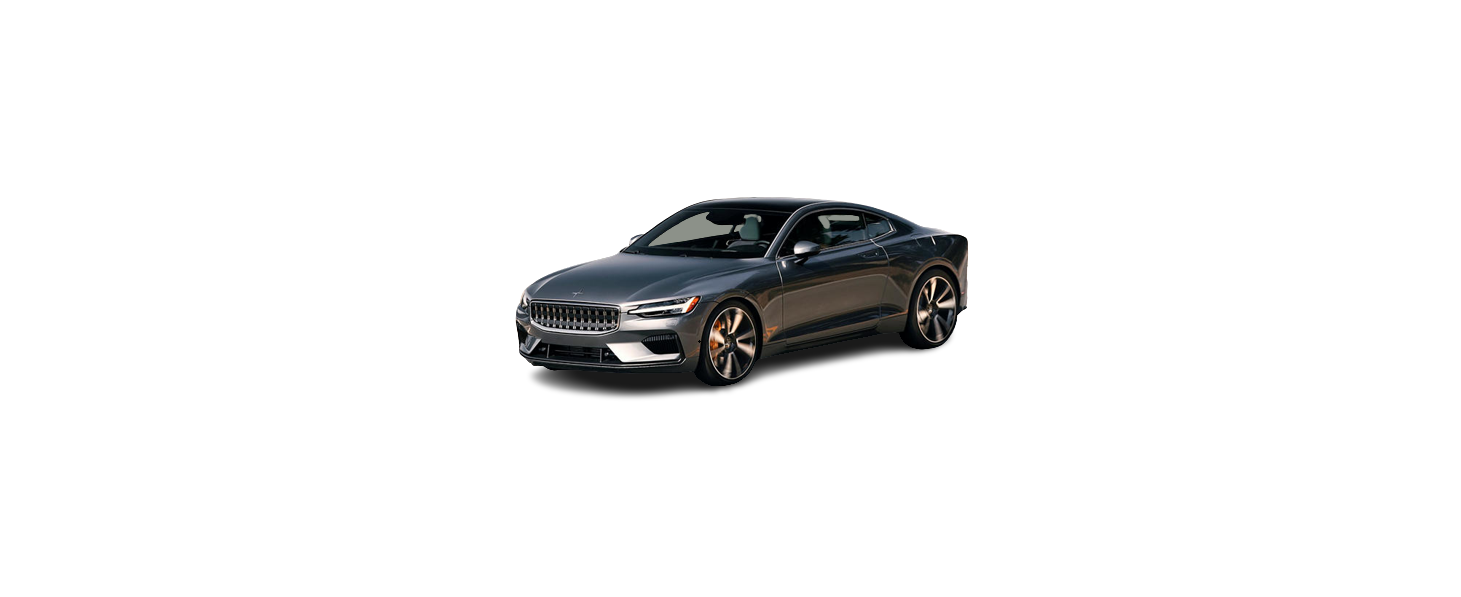2021 Polestar 1 Starting and switching off vehicle

Electronic immobilizer
- The electronic immobilizer is a start inhibitor that helps prevent the vehicle from being started by an unauthorized person.
- The vehicle can only be started with the right key.
The following instrument panel error messages are related to the electronic immobilizer:
| Symbol | Message | Meaning |
|---|---|---|
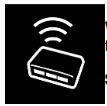 |
Vehicle key not found
See Manual |
Key not recognized during start. Place the key on the key symbol in the cupholder and try to start the vehicle again. |
Remote immobilizer with tracking system
The vehicle is equipped with a system that makes it possible to track and locate the vehicle and to remotely activate the immobilizer to prevent the vehicle from being started. Contact Polestar Customer Support for more information and assistance activating the system.
The following instrument panel error messages are related to the remote immobilizer with tracking system:
| Symbol | Message | Meaning |
|---|---|---|
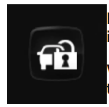 |
Remotely immobilised
Vehicle not possible to start |
The remote immobilizer with tracking system is activated. The vehicle cannot be started. Contact Polestar Customer Support. |
Ignition modes
To enable the use of a limited number of functions when the engine is not running, the ignition can be put in one of three different levels: 0, I and II. These levels are referred to as “ignition modes” in the Manual.
The following table shows which functions are available in each ignition mode:
| Mode | Functions |
|---|---|
| 0 |
In this mode, the functions are available for a limited time and then switch off automatically. |
| I |
Electrical current will be taken from the battery in this ignition mode. |
| II |
This ignition mode uses a lot of current from the battery and should be avoided whenever possible! |
Jump starting using another battery
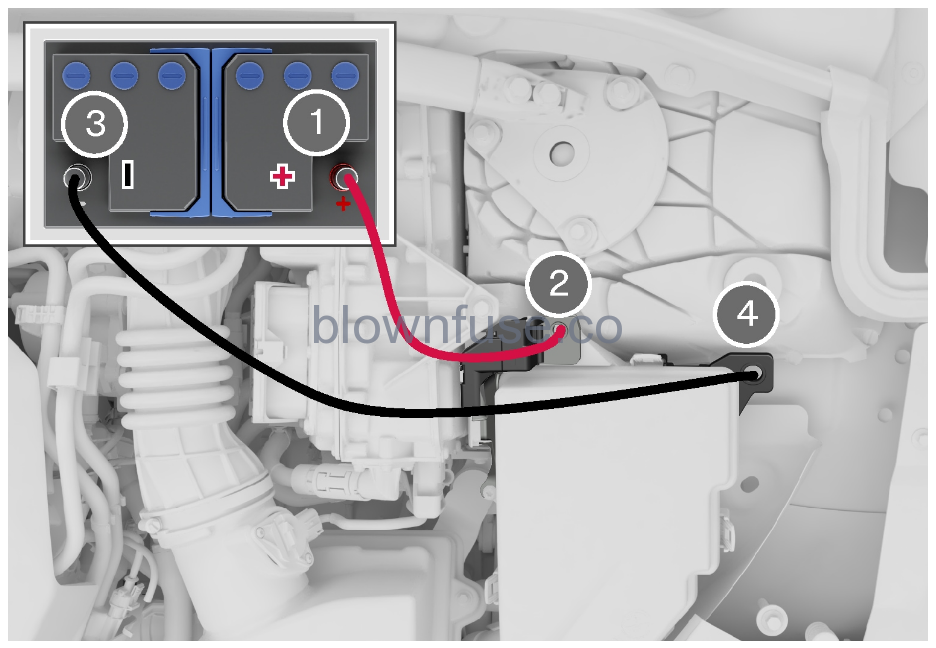
Jumper cable connecting points.
The charging point of the vehicle is only intended for jump starting the vehicle in question. The charging point is not intended for jump-starting another vehicle. Using the charging point to start another vehicle could cause a fuse to blow, which would cause the charging point to stop working.
To avoid short circuits or other damage, the following steps are recommended when jump starting the battery:
- Put the ignition in mode 0.
- Make sure the auxiliary battery (the battery used to jump start the discharged battery) has a voltage of 12 volts.
- If the auxiliary battery is in another vehicle, turn off that vehicle’s engine and make sure that the vehicles are not touching each other.
- Clamp the red jumper cable onto the auxiliary battery’s positive (+) terminal (1).
Use caution when connecting the jumper cables. A short circuit can occur if the ends come in contact with any other surface than the charging points.
- Fold back the cover over your vehicle’s positive (+) jump start terminal (2).
- Clamp the other end of the red jumper cable to your vehicle’s positive (+) jump start terminal (2).
- Clamp the black jumper cable onto the auxiliary battery’s negative (-) terminal (3).
- Clamp the other end of the black jumper cable to your vehicle’s negative (-) ground point (4).
- Make sure the jumper cables are securely attached to help prevent sparks while jump starting.
- Start the engine of the assisting vehicle and let it run for a few minutes at a higher idling speed than normal, about 1500 rpm.
- Start your vehicle’s engine. If the engine does not start, allow an additional 10 minutes of charging time and then try to start the engine again.
When the engine is started under normal conditions, the vehicle’s electrical drive motor is prioritized – the gasoline engine remains off. This means that after the start knob has been turned clockwise, the electric motor has “started” and the vehicle is ready to be driven. Start of the electric motor is indicated by the indicator lights on the instrument panel going out and its preselected theme illuminating.
Do not touch the connections between the cable and the vehicle during the start attempt. Risk of sparking.
- Remove the jumper cables in the reverse order ‒ first the black cables and then the red cables.
- Make sure that none of the clamps of the black jumper cables come into contact with either vehicle’s positive (+) jump start terminals or either of the red jumper cable’s connected clamps.
WARNING
PROPOSITION 65 VARNING!WARNING! Battery posts, terminals, and related accessories contain lead and lead compounds, chemicals known to the state of California to cause cancer and reproductive harm. Wash hands after handling.
- Batteries generate hydrogen gas, which is flammable and explosive. A spark caused by an incorrectly connected jumper cable could be enough to make the battery explode.
- Do not connect the jumper cable to any part of the fuel system or to any moving parts. Avoid touching hot manifolds.
- Battery fluid contains sulfuric acid. Do not allow battery fluid to contact eyes, skin, fabrics or painted surfaces.
- If contact occurs, flush the affected area immediately with water. Obtain medical help immediately if eyes are affected.
- Never expose the battery to open flame or electric spark. Do not smoke near the battery. Failure to follow the instructions for jump starting can lead to injury.
The vehicle cannot be started if the hybrid battery is discharged.
If the starter battery has been discharged to the extent that the vehicle does not have normal electrical functions and the engine must then be jump-started with an external battery or a battery charger, the Start/Stop function may remain activated. If the Start/Stop function shortly thereafter auto-stops the engine, there is a huge risk that auto-start of the engine will fail due to insufficient battery capacity since the battery had not had time to recharge.
If the vehicle has been jump-started or if there has not been enough time for the battery to be charged with a battery charger, the Start/Stop function should be temporarily deactivated until the battery has been recharged by the vehicle. At an ambient temperature of about +15°C (about 60°F), the battery must be charged by the vehicle for at least one hour. At lower ambient temperatures, the charging time can increase to 3-4 hours. It is advisable to charge the battery with an external battery charger.
Selecting ignition mode
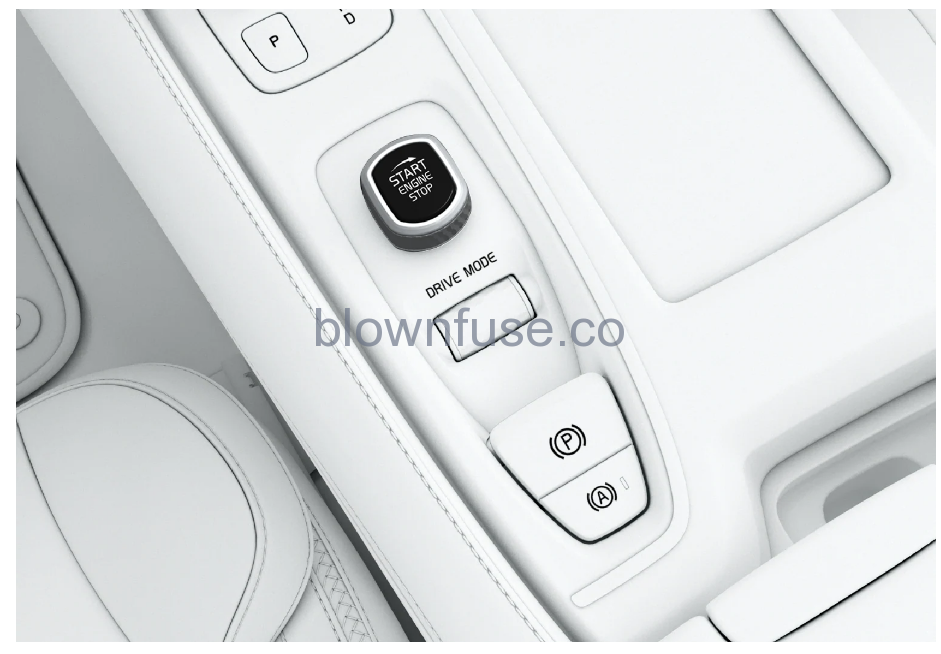
Start knob in the tunnel console.
- Ignition mode 0 – Unlock the vehicle and keep the key in the passenger compartment.
- Ignition mode I – Turn the start knob clockwise and release it. The control will automatically return to the original position.
- Ignition mode II – Turn the start knob clockwise and hold it there for approx. 5 seconds. Release the knob, which will automatically return to its original position.
- Back to ignition mode 0 – To return to ignition mode 0 from modes I and II, turn the start knob clockwise and release it. The control will automatically return to the original position.
Starting the vehicle
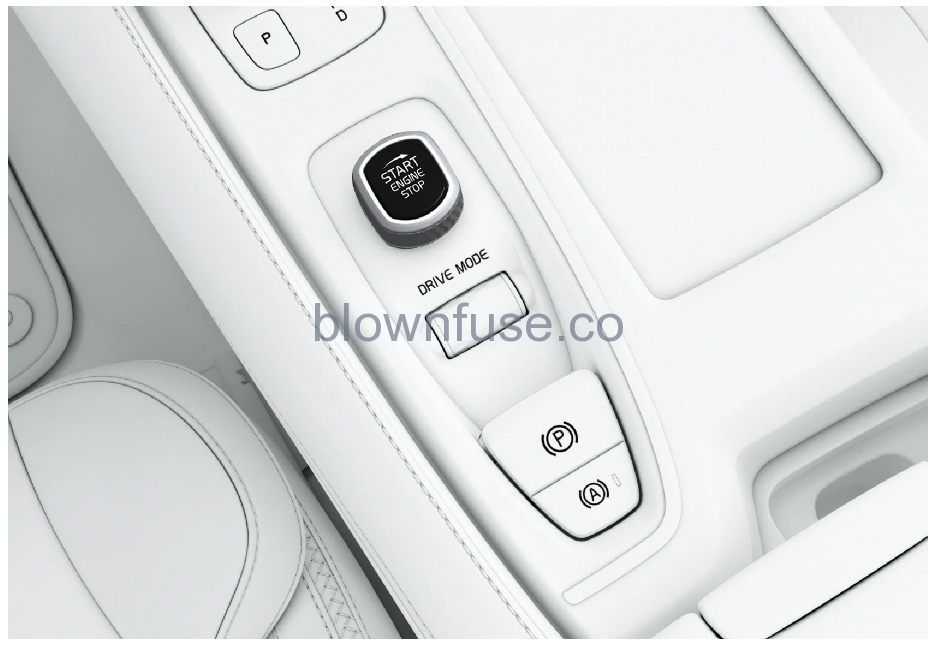
Start knob in the tunnel console.
Before starting:
- Buckle your seat belt.
- Adjust the seat, steering wheel and mirrors.
- Make sure you can fully depress the brake pedal.
Make sure the key or phone is in the vehicle.
-
Press and hold down the brake pedal as far as possible. Make sure that gear selector position P or N is selected.
- Turn the start knob clockwise and release. The control will automatically return to the original position.
- Never use more than one inlay mat at a time on the driver’s floor. If any other type of floor mat is used, remove the original mat from the driver’s seat floor before driving. All types of mats must be securely anchored in the attachment points in the floor. Make sure the floor mat does not impede the movement of the brake pedal or accelerator pedal in any way, as this could be a serious safety hazard.
- Polestar’s floor mats are specially manufactured for your vehicle. They must be properly secured in the attachment points in the floor to help ensure they cannot slide and become trapped under the pedals.
If the hybrid battery is discharged and the engine has not responded after 3 attempts – wait for 3 minutes before starting a new attempt. Starting capability increases if the starter battery is given time to recover.
The vehicle cannot be started if the charging cable is plugged in. Make sure that the charging cable is unplugged from the charging socket before attempting to start the vehicle.
With a cold start, idling speed may be considerably higher than normal. This is done to get the emissions system up to normal operating temperature as quickly as possible, which minimizes exhaust emissions and protects the environment.
- When starting in cold weather, the automatic transmission may shift up at slightly higher engine speeds than normal until the automatic transmission fluid reaches normal operating temperature.
- Do not race a cold engine immediately after starting. This could prevent fluids from properly lubricating vital components in the engine before it has reached the proper operating temperature.
- The engine should be idling when the gear selector is moved. Never accelerate until the gear is fully engaged. Accelerating rapidly before a gear is properly engaged could lead to harder wear of components.
- To help prevent the transmission oil from overheating, select P or N when idling at a standstill for prolonged periods of time.
The starter motor will crank until the engine starts or until overheating protection is triggered.
During normal start conditions, the vehicle’s electric motor will be prioritized and the gasoline engine will remain off. This means that once the start knob is turned clockwise, the electric motor has been “started” and the vehicle is ready to be driven. The warning and information symbols in the instrument panel will go out and the selected theme will be displayed to indicate that the electric motor is activated.
In some situations, such as in cold weather or if the hybrid battery’s charge level is too low, the gasoline engine will start instead.
Error messages
If the Vehicle key not found message is shown in the instrument panel at start, place the key or the phone with Digital Key at the backup reader and then make a new start attempt.
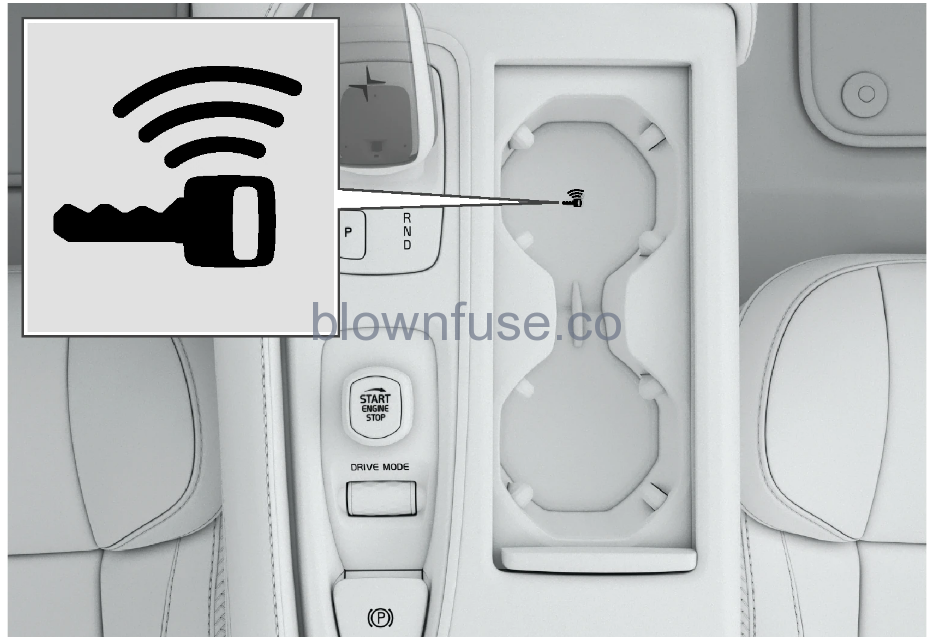
Location of the backup reader in the tunnel console.
When the key is placed in the backup reader, make sure that no other vehicle keys, metal objects or electronic devices (e.g. cellular phones, tablets, laptops or chargers) are in the backup reader. Multiple vehicle keys close to each other in the backup reader can disrupt their functionality.
If the Vehicle start system checks, the wait is displayed in the instrument panel while attempting to start the vehicle, wait until the message disappears and try again to start the vehicle.
Never remove the key or phone with Digital Key that is being used from the vehicle while driving.
- Always take the key or phone with Digital Key with you from the passenger compartment when you leave the vehicle and make sure the ignition is in mode 0.
- Always put the gear selector in P and apply the parking brake before leaving the vehicle. Never leave the vehicle unsupervised while the engine is running.
- Always open the garage door fully and make sure that ventilation is very good before starting the engine in a garage. The exhaust fumes produced by the vehicle contain carbon monoxide, which is invisible and odorless but very toxic.
Switching off the vehicle
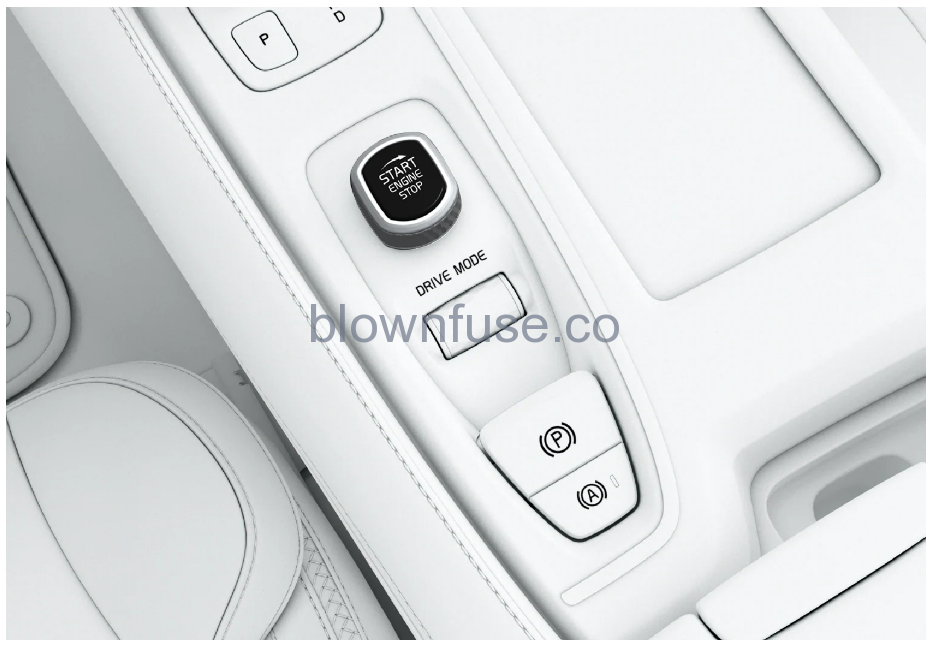
Start knob in the tunnel console.
- Turn the start knob clockwise and release to switch off the vehicle. The control will automatically return to the original position.
If the vehicle rolls:
- Turn clockwise and hold the knob until the vehicle switches off.
